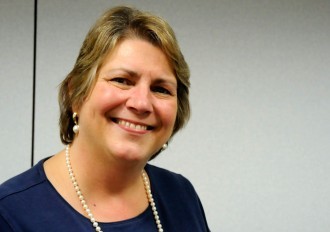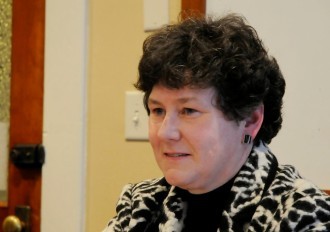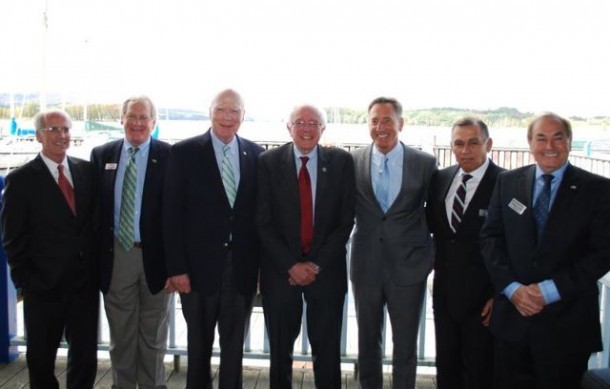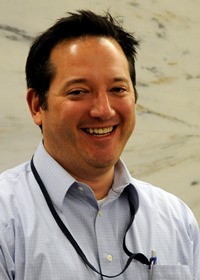STATE SUSPENDS APPROVAL FOR EB-5 FUNDED BIOTECH COMPANY
Gov. Peter Shumlin has asked the state’s chief financial regulator to probe plans for a massive Northeast Kingdom development after a state agency raised significant and critical questions about the finances for a multimillion dollar biotech project in Newport.
State approval for AnC Bio Vermont was suspended in August.
At the governor’s behest, the state agency that oversees the EB-5 immigrant investor program has asked the Department of Financial Regulation to determine whether the $118 million biotech project in Newport complies with state and federal securities laws.
The suspension of AnC Bio’s memorandum of understanding comes as the state has reorganized its oversight of EB-5 projects. The protection of investor interests will now be the responsibility of the Department of Financial Regulation. The Agency of Commerce and Community Development, which had been solely responsible for EB-5 marketing and oversight, will now handle promotion only.
AnC Bio Vermont is run by Ariel Quiros and Bill Stenger, the developers of the Jay Peak Resort. The 67,000-square-foot biotech facility would manufacture organ replacement devices, conduct adult stem cell research and offer “clean rooms” to universities and other biotech companies.
In August, the agency asked the developers to submit a new application for AnC Bio Vermont with disclosures about the use of investor funds, business plans, market studies and FDA approvals for stem cell research and medical devices to be manufactured at the plant.
ACCD Secretary Pat Moulton said agency officials became concerned about the financial health of AnC Bio when they learned in May that the parent company’s headquarters in Seoul had been seized by creditors and sold at a public auction in 2013.
Moulton and agency officials insisted that Stenger and Quiros update business plans for the proposed biotech company immediately.
“We told them we needed to get together, and we needed you to update this,” Moulton said. “We need to do that and we need to do it quickly and we want you to stop doing any marketing because we want to make sure your private placement memorandum (the business plan for prospective investors) is disclosing everything and presenting all the right information so that any prudent investor could determine ‘Yes or no, I want to put my money in this deal.’”
Stenger and Quiros have spent $282 million from 564 immigrant investors on a large-scale expansion of Jay Peak Resort that includes three hotels, three restaurants, a conference center, an indoor water park, an ice arena and condominiums. The developers have planned to use another $300 million in EB-5 funds for AnC Bio, Q Burke Mountain Resort, and the West Bowl expansion at Jay Peak.
The state canceled the West Bowl expansion in August and both AnC Bio and Q Burke projects are now under Department of Financial Regulation scrutiny. The regional center also passed along concerns to the department about existing projects at Jay Peak that have come under fire from a group of investors. All Vermont EB-5 projects will be reviewed by the department.
“We welcome State oversight of our EB-5 projects,” Stenger said in a statement. “The State’s oversight is in large part what has made our EB-5 program so successful. It is what has allowed us to create over 2,500 jobs, have over 600 investors receive their green cards and inject some economic vitality into the Northeast Kingdom.”
Stenger says the AnC Bio project is on track and he says the company will break ground this spring.
If the Department of Financial Regulation determines that the developers are out of compliance with state and federal securities and immigration laws, Commissioner Susan Donegan can revoke state approval.
Vermont was one of the early adopters of the national immigrant investor program and started its own regional center in 1997. The Vermont Regional EB-5 Center had been responsible for approving new investor-funded developments, marketing projects overseas and ensuring that the projects comply with federal requirements. State officials could not say how many projects in Vermont have been reviewed by the center.
The center’s reputation was tarnished by negative publicity about a Jay Peak project last fall.
VTDigger stories regarding complaints by some Tram Haus investors about how they were treated by Jay Peak developers, Quiros and Stenger, raised questions about whether the agency has provided adequate oversight of the EB-5 program. The developers converted the equity stakes investors held in a hotel at the resort into unsecured loans in August 2013. Investors in the Tram Haus Lodge were officially informed about the details nine months after the fact. The investors say complaints they sent to the regional center in May 2014 were largely ignored.
Quiros, the owner of Jay Peak, has said the dissolution of the Tram Haus investors’ agreement was “200 percent” ethical. Stenger and Quiros maintain that the IOU gives investors a guarantee of repayment in five years.
Moulton, who was appointed secretary in June, says the new arrangement with the Department of Financial Regulation is designed to “prevent this kind of complaint scenario again in the future” and to repair damage to the state’s reputation with investors overseas.
The negative publicity caused “a tremendous amount of fallout,” Moulton said, and the department is working to reassure immigrant investors around the world that the state is protecting their interests. “Any kind of negative anything on EB-5 spreads like wildfire globally,” she said. “We’ve seen that, we’ve felt that.”

Pat Moulton
Patricia Moulton is secretary of the Agency of Commerce and Community Development. File Photo by Hilary Niles/VTDigger
Shumlin asked the agency to change the regulatory process for EB-5 projects the same month VTDigger published a report about the state’s lax oversight of Jay Peak and the close ties between the developers and state officials.
“The governor was the one who said, ‘Why don’t we look at this captive model where you guys are drumming up the projects and DFR is doing the regulatory piece?’” Moulton recalls.
Through the agreement with the Department of Financial Regulation, which has a reputation for high standards and tough enforcement of state insurance and securities regulations, the agency hopes to restore investor faith in the state’s EB-5 program. The department is hiring an analyst and an examiner specifically to handle EB-5 project compliance with state and federal securities laws.
Donegan, the DFR commissioner, would not talk about the status of pending reviews for any specific projects. She emphasized that the Jay Peak-related projects, including AnC Bio, “are by no means subject to special scrutiny.” DFR will apply the same “ordinary” level of review to all EB-5 projects in Vermont, she said.
“DFR is not singling out any particular project and hopes to work well with all projects as we undertake review of any offering or amended offerings,” Donegan said. “Our goal is simple. We want to ensure that Vermont’s EB-5 Regional Center maintains its high standards and good reputation for the benefit of economic development statewide. Vermont has seen a great deal of positive development already from EB-5 projects including those outside of the Jay Peak programs. We believe good oversight and economic growth go hand in hand.”
In general, she said, the department is responsible for ensuring that investors receive adequate information about a company’s business plan, financial standing and structure.
“This is about telling people enough information so that people can make a reasonable and full choice about whether or not they want to hand over their money,” Donegan said.
The securities issued through the EB-5 program are exempt from filings with the Securities and Exchange Commission, the federal agency that regulates the investment industry, and that makes disclosure of financial information especially critical, Donegan said.

Susan Donegan
Department of Financial Regulation Commissioner Susan Donegan. File Photo by Hilary Niles/VTDigger
“Full disclosure means they (the investors) understand the business plan and they’ve got the information to make their decision (about whether to invest),” Donegan said. “It’s about reasonableness, it’s about full disclosure that’s fair.”
Tony Sutton, a spokesman for a group of 20 disgruntled investors in the Tram Haus Lodge, a hotel at Jay Peak, has said investor requests for financial disclosures relating to the Tram Haus project and complaints about the way investors were treated by Quiros and Stenger made in May last year have been largely ignored by the Vermont Regional Center and the Jay Peak developers. A VTDigger story in October based on emails obtained under the public records law showed that the head of the center, Brent Raymond, has had a tight relationship with Bill Stenger, and once referred to him as a “great man.”
Sutton says the state reorganization of oversight duties is a direct result of investor complaints “bringing exposure of Jay Peak’s financial misconduct, the failure of the VRC to supervise and oversee Jay Peak and VTDigger’s investigation of those issues.”
Sutton remains critical of the state’s handling of investor complaints, which he says were sent to the Department of Financial Regulation in July.
“DFR is responsible for regulating securities in Vermont, but it immediately deferred the matter to the Vermont Regional Center,” Sutton wrote in an email. “It is incredible that such a serious matter relating to possible securities violations and financial misconduct has not been followed up by DFR before now. “If the DFR is truly committed and sincere in its intentions to bring long overdue meaningful oversight, accountability and compliance with State and Federal Regulations to the VRC and Jay Peak’s (JP) projects, DFR must take real actionable steps to protect the interests of investors and hold JP and its owners fully accountable for their wrongdoings,” Sutton said. “DFR must immediately require, that Jay Peak, Stenger and Quiros provide full disclosure to all its current and past EB5 investors, all of its financial transactions and business activities in each of its offerings to date and reject the Quiros notion that Jay Peak is ‘200% ethical.’ ”
Donegan says that DFR’s securities division did not receive a direct investor complaint about Tram Haus Lodge. “If we had, we would have reviewed the complaint to determine whether we had jurisdiction under Vermont’s securities laws and certainly would have responded to the investor one way or another,” she said.

Tony Sutton, one of 35 Jay Peak Phase 1 investors. Courtesy Photo
Moulton says she is “sorry to hear (the investors) feel frustrated,” and she says the agency was not happy with Stenger and Quiros’ “inappropriate” lack of communication, but she maintains that “the issues (the investors) keep bringing up are between they and the partner.” She points to the limited partnership agreement between the developers and the investors that gives Quiros and Stenger broad powers of authority. The agency, she said, has no jurisdiction over the agreement that investors willingly signed.
“If someone were to file a fraud complaint with DFR that would likely trigger an investigation,” Moulton said. “It seems like, from what I see, their issues are more ‘it didn’t work out the way I expected,’ as opposed to ‘I’ve been unfairly treated.’ I don’t know that we can respond.”
A CHANGING REGULATORY LANDSCAPE
When the state launched the Vermont EB-5 Regional Center in 1997, the EB-5 movement nationally was in its infancy, and what distinguished Vermont’s program was state oversight. Instead of allowing nonprofit and for-profit centers to form as other states have done, Vermont embedded the regional center in the Agency of Commerce and Community Development and promised investors the center would provide oversight for the projects.
The state has banked on that promise and its clean green rural reputation to promote developers’ projects to investors around the world. The Tram Haus investors say it was the seal of state approval that made the Jay Peak projects appealing.
State officials and the congressional delegation have been gung-ho about EB-5 over the years because it enabled the state to infuse investment cash into ski area construction and boost employment. And the fruits of the program have borne out: The JayPeak developments, for example, have led to unprecedented job growth in the poorest region of the state, according to Tom Kavet, an economist for the Vermont Legislature.
Gov. Howard Dean formed the center at the end of his tenure, and the program began to take shape during Gov. Jim Douglas’ tenure. In 2009, Douglas went on a promotional tour of Asia with Stenger and Quiros. Sen. Patrick Leahy, D-Vt., has been a staunch backer of the program in Congress and helped to ensure reauthorization of EB-5 in 2012.

Congressional delegation, Stenger, Quiros
Rep. Peter Welch, Bill Stenger, Sen. Patrick Leahy, Sen. Bernie Sanders, Gov. Peter Shumlin, Ariel Quiros and Bill Kelly.
Leahy, Sen. Bernie Sanders, Rep. Peter Welch and Gov. Peter Shumlin were all on hand in September 2012 for the announcement of Stenger and Quiros’ $600 million Northeast Kingdom Development Initiative, which included AnC Bio, Q Burke and the buildout of Jay Peak. A picture of the pols, Stenger, Quiros and Kelly was later used in promotional materials for investors.
Shumlin continued the tradition of political boosterism for the developers of Jay Peak. In September 2013, he went on an EB-5 promotional tour in Vietnam and China paid for by Jay Peak. And a former key Shumlin aide, Alex MacLean, who worked for Stenger at the time, helped to produce marketing materials for Jay Peak that included a video with the governor saying the state “audits” EB-5 projects. (Audits were requested but not required of Jay Peak projects, and the state never performed them.)
The enthusiastic support of Jay Peak was not limited to politicians. Brent Raymond, the head of the regional center who spends much of his time flying overseas promoting EB-5 projects, defended the developer against investor complaints and in emails obtained by VTDigger last fall. Shortly after the VTDigger story in October was published, Moulton wrote a commentary blasting the article as “inaccurate.” After the VTDigger stories were published, the state began requiring quarterly reports, as mandated in the original agreements with the developers.

Brent Raymond
Brent Raymond, director of Vermont’s EB-5 Regional Center. File photo by Hilary Niles/VTDigger
The state has been in an uneasy role. The regional center has been responsible for promotion and oversight. And the disgruntled Tram Haus investors say the center’s oversight and responsiveness to complaints has been negligible.
FRAUD ALLEGED ELSEWHERE
In the past two years, some highly publicized EB-5 fraud cases in other states have been exposed. For instance, the SEC’s investigation of the Chicago Convention Center fraud scheme led to the developer’s indictment after investigators found the developer put $2.5 million of administrative fees collected from immigrant investor funds into a personal bank account.
In response to the Chicago investigation, Vermont and federal regulators have tightened disclosure, application and compliance requirements.
Until 2014, regional center oversight was “fairly loose,” Moulton says. After the Chicago investigation, the center revamped its approval process for EB-5 projects and expanded its memorandum of understanding (“MOU”) requirements.
“We realized the watchdogs are here and we need to be more responsive,” Moulton said.
“It’s clearly evolved over time, and now it’s evolved to the point where there’s SEC scrutiny on projects,” Moulton said. “We had taken the template that USCIS gave us initially as an MOU and we’ve improved it, it literally went from four pages to 14 pages on our own volition to say look we’ve got to tighten this up. In fact, we’re told by USCIS our MOU is one of the tighter ones.”
In 2014, the regional center began requiring EB-5 developers to agree to an audit provision in the MOU.
And in May last year, the agency hired a securities law firm to scrutinize Stenger and Quiros’ financial disclosures for AnC Bio. Raymond was concerned about the sale at auction of an affiliated company headquarters in South Korea.
The AnC Bio project was also “firmly into the securities area,” Moulton said, and “that’s not our bailiwick.”
The regulatory agreement with DFR in December was the culmination of nine months of investor complaints, bad publicity and an unsatisfactory six month back and forth between the agency and Stenger and Quiros over financial disclosures.
The MOU between the two state entities was finalized on Dec. 22, 2014. The state announced the new collaboration in a press release on Feb. 20, the day VTDigger filed a public records request for state communications about the suspension of the AnC Bio project in Newport.
“We weren’t intending to get DFR involved in any existing projects, just new projects, and it became pretty clear when we started running up legal bills with outside counsel that we can’t afford to keep doing this,” Moulton said.
Moulton, Donegan and the governor recognized that the center’s dual marketing and oversight role was inherently problematic. “We had one guy (Raymond) trying to do sales and compliance, and we looked at our captive insurance model, and we said, that works — we’re the sales people and DFR are the regulatory people, why can’t we do that with EB-5?” Moulton said.
Separating EB-5 promotional activities from regulatory compliance, Moulton says, “makes it cleaner.”
Source: VTDigger
Mentions
- Bill Stenger
- Vermont EB5 Regional Center
- Jay Peak - AnC Bio Vermont
- Newport Main Street Renaissance Block
- Jay Peak - Q Burke Mountain Resort, Hotel and Conference Center L.P.
- Chicago Convention Center
States
- Vermont
Securities Disclaimer
This website is for informational purposes only and does not constitute an offer or solicitation to sell shares or securities. Any such offer or solicitation will be made only by means of an investment's confidential Offering Memorandum and in accordance with the terms of all applicable securities and other laws. This website does not constitute or form part of, and should not be construed as, any offer for sale or subscription of, or any invitation to offer to buy or subscribe for, any securities, nor should it or any part of it form the basis of, or be relied on in any connection with, any contract or commitment whatsoever. EB5Projects.com LLC and its affiliates expressly disclaim any and all responsibility for any direct or consequential loss or damage of any kind whatsoever arising directly or indirectly from: (i) reliance on any information contained in the website, (ii) any error, omission or inaccuracy in any such information or (iii) any action resulting therefrom.



